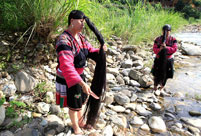

Experts call for 10-year fishing ban in Yangtze
After China's massive fishing fleet has significantly overfished some areas, to the extent that some parts of the East China Sea are totally fished out, authorities have vowed to impose strictly reduced quotas and reduce the fishing fleet to protect marine ecosystems.
According to China's Ministry of Agriculture (MOA), fishery resources are severely depleted and there are practically "no fish" in some areas such as the East China Sea, China National Radio (CNR) reported on Sunday.
The situation in the Yellow Sea and Bohai Sea is no better than the East China Sea, while the situation in the South China Sea is better, Wang Yamin, a professor with the School of Oceanography at Shandong University, told the Global Times on Monday.
Though China has long implemented measures, including moratoriums on fishing for several months a year, the severe amount of overfishing has continued due to the large number of fishermen who depend on fishing for their living, and weak government supervision on excessive and illegal fishing, Wang said.
The country's annual catch in the seas hit 13 million tons in recent years, although the allowed volume is set between 8 million to 9 million tons, according to the ministry.
The ministry added that currently the annual freshwater catch in the Yangtze River, which accounts for 60 percent of the country's total freshwater fish output, is about 100,000 tons per year, less than a quarter of what Yangtze fishermen routinely caught in 1954.
The Yangtze is regarded as a cradle of China's freshwater fisheries and a valuable reserve of aquatic biodiversity. There are 370 fish species in the Yangtze, 170 of which are only found in that river. However, most of them are now faced with being wiped out from the river system, although pollution is also a factor in species decline in the river.
Academicians at the Chinese Academy of Sciences called for a 10-year ban on fishing in the Yangtze instead of a temporary moratorium, the Xinhua News Agency reported in late June.
The Yangtze fishing moratorium started in 2003, covering 10 provinces and municipalities. The ban originally took effect from February to April in the upper reaches, and from April to June in the lower reaches. In 2016, the MOA extended the area and the time to four months.
China has also imposed an annual summer fishing ban in the Yellow Sea and East China Sea since 1995, and later in the South China Sea.
Turning point
The depletion of fishery resources in China's coastal waters has driven many fishermen to risk their lives by illegally fishing in other countries' waters. In 2014, a Chinese fisherman was shot dead by the South Korean Coast Guard, who said that the man was fishing illegally.
China needs to draft and carry out a plan to manage the total volume of fishery resources, including allocating quotas, eliminating the use of small-holed nets and unlicensed fishing vessels, as well as strengthening the control of water pollution at Dongting Lake and ecological protection along the Yangtze River, Agriculture Minister Han Changbin was quoted as saying by CNR.
The priorities are to conserve present resources and increase fishermen's income, while reducing production, Han noted.
A nationwide campaign on illegal fishing tools has meant the confiscation of 600,000 small-holed nets since last year, according to the MOA. The ministry has listed the trial of such a policy as a priority for 2016.
"It's a watershed moment for China's fishing industry, as it's the first time the ministry has vowed to implement the limited and reduced quota policy as routine, although the policy has been studied for years," Wang said.
According to fishfirst.cn, by the end of 2014, China had about 1.06 million fishing vessels.
 World's fastest bullet train to start operating next month
World's fastest bullet train to start operating next month Huangluo: China's 'long hair village'
Huangluo: China's 'long hair village' Spectacular bridge with one of the tallest piers in the world
Spectacular bridge with one of the tallest piers in the world Magnificent view of Hukou Waterfall
Magnificent view of Hukou Waterfall A glimpse of Stride 2016 Zhurihe B military drill
A glimpse of Stride 2016 Zhurihe B military drill US Navy chief tours Liaoning aircraft carrier
US Navy chief tours Liaoning aircraft carrier Chinese American woman wins Miss Michigan
Chinese American woman wins Miss Michigan Centenarian couple takes first wedding photos
Centenarian couple takes first wedding photos Traditional Tibetan costumes presented during fashion show
Traditional Tibetan costumes presented during fashion show Top 10 livable Chinese cities
Top 10 livable Chinese cities Top 20 hottest women in the world in 2014
Top 20 hottest women in the world in 2014 Top 10 hardest languages to learn
Top 10 hardest languages to learn China’s Top 10 Unique Bridges, Highways and Roads
China’s Top 10 Unique Bridges, Highways and Roads Stop politicizing doping: observer
Stop politicizing doping: observer Weibo explodes over news of actor’s divorce
Weibo explodes over news of actor’s divorce Japanese teacher spends decades researching Nanjing Massacre
Japanese teacher spends decades researching Nanjing Massacre After 2 years of regulatory limbo, govt to legalize popular QR code payment services
After 2 years of regulatory limbo, govt to legalize popular QR code payment servicesDay|Week